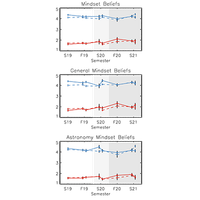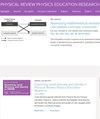Prevalence of a growth mindset among introductory astronomy students
IF 2.6
2区 教育学
Q1 EDUCATION & EDUCATIONAL RESEARCH
Physical Review Physics Education Research
Pub Date : 2024-05-10
DOI:10.1103/physrevphyseducres.20.010140
引用次数: 0
Abstract
While many previous studies have indicated that encouraging a growth mindset can improve student learning outcomes, this conclusion’s applicability to college-level astronomy classrooms remains poorly understood owing to the variation in students’ overall and domain-specific learning attitudes. To address this, we surveyed undergraduate students in an introductory astronomy class about their attitudes towards learning astronomy over the course of five semesters. Overall, students felt an affinity for astronomy, felt moderately competent, perceived astronomy to be intermediate in terms of difficulty, and agreed strongly with standard statements reflecting a “growth mindset,” i.e., the belief that intelligence is malleable rather than fixed from birth. Their responses were stable over the course of the semester and did not appear to depend strongly on student demographics. The unexpected start of the COVID-19 pandemic and the associated shift to all-virtual learning correlated with a drop in their affinity for astronomy, a small decrease in their perceived competence, and an increase in the perceived difficulty of the topic. Their overall learning mindset showed negligible change during this time, emphasizing the stability of their belief in a growth mindset as compared to other measured learning attitudes. However, more nuanced questions about their behaviors and interpretations in the classroom, about how they felt “in the moment,” and about what factors were most important for their success in the class revealed significantly lower alignment with a growth mindset. This suggests that while introductory astronomy students may believe that they have a growth mindset, this mindset is not necessarily reflected in their self-reported classroom behaviors or measured responses to actual learning challenges.

天文学入门学生中成长心态的普遍性
尽管之前的许多研究都表明,鼓励学生树立成长型思维模式可以提高学生的学习成绩,但由于学生的整体学习态度和特定领域的学习态度存在差异,因此这一结论在大学天文学课堂上的适用性仍然鲜为人知。为了解决这个问题,我们对天文学入门班的本科生进行了调查,了解他们在五个学期中对学习天文学的态度。总体而言,学生们对天文学有亲近感,觉得自己的能力适中,认为天文学在难度上处于中等水平,并且非常同意反映 "成长心态 "的标准陈述,即认为智力是可塑的,而不是天生固定的。他们的回答在整个学期中都很稳定,似乎与学生的人口统计学特征没有很大关系。COVID-19 大流行的意外开始以及与此相关的向全虚拟学习的转变与他们对天文学的亲和力下降、他们认为的能力略有下降以及他们认为的课题难度增加有关。在此期间,他们的整体学习心态变化微乎其微,与其他测量的学习态度相比,强调了他们对成长心态信念的稳定性。然而,关于他们在课堂上的行为和解释、关于他们 "当下 "的感受以及关于什么因素对他们在课堂上取得成功最重要等更细微的问题,却显示出他们与成长型思维模式的一致性明显降低。这表明,尽管天文学入门课程的学生可能认为自己具有成长型思维模式,但这种思维模式并不一定反映在他们自我报告的课堂行为或对实际学习挑战的测量反应中。
本文章由计算机程序翻译,如有差异,请以英文原文为准。
求助全文
约1分钟内获得全文
求助全文
来源期刊

Physical Review Physics Education Research
Social Sciences-Education
CiteScore
5.70
自引率
41.90%
发文量
84
审稿时长
32 weeks
期刊介绍:
PRPER covers all educational levels, from elementary through graduate education. All topics in experimental and theoretical physics education research are accepted, including, but not limited to:
Educational policy
Instructional strategies, and materials development
Research methodology
Epistemology, attitudes, and beliefs
Learning environment
Scientific reasoning and problem solving
Diversity and inclusion
Learning theory
Student participation
Faculty and teacher professional development
 求助内容:
求助内容: 应助结果提醒方式:
应助结果提醒方式:


